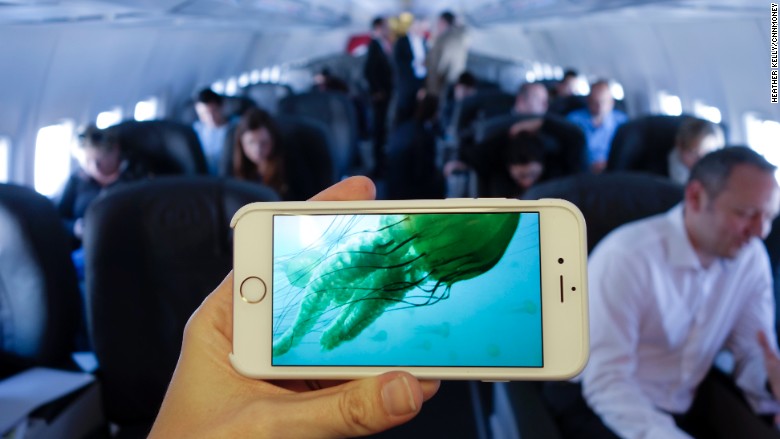
When airlines first announced they could offer wireless internet, in the sky, it was a technological miracle. Sending emails and browsing the web at 36,000 feet was a novelty, something to brag about on social media.
Awe quickly turned to complaining, which was then amplified by being crammed into a flying metal tube. In-flight coverage was spotty, slow, broken, or overpriced. Gogo Inflight, the main provider of wifi in the U.S., bore the brunt of anger. It's a company people love to hate.
Gogo hopes to change that with a new satellite in-flight internet system called 2Ku. The 70 MBPS connection is significantly faster than Gogo's older systems, which rely on ground-to-air connections and get about 10 MBPS.
Related: American Airlines sues Gogo for slow in-flight Wi-Fi
"To date we've had browsing on board, sending messages and sending text. We haven't been able to have the same connectivity on board you've had on the ground. We now have that," said Stephen Scott, head of global innovation at International Airlines Group.
International Airlines Group, which owns British Airways, Aer Lingus and Iberia airlines, announced on Thursday it will be one of the first carriers to add the technology. It's retrofitting 90% of its fleet over the next three years to offer 2Ku. Some Aeromexio flights also have it installed, and Delta (DAL) said by the end of 2016, it should be on around 30 of its planes.
To demonstrate the new internet, Gogo took a group of Silicon Valley reporters on a one hour plane ride to nowhere. I opened Netflix on my phone and streamed "Blue Planet," FaceTimed my best friend, tweeted selfies from the cockpit, and watched a Nova special called "Why Planes Vanish" on a laptop.
The videos all loaded quickly and played at high quality. The FaceTime call was spottier, but even with some video lag I was able to carry on a normal conversation.
Speed tests showed decent download speeds of around 12 MBPS, but significantly pokey upload speeds. Gogo says this is actually by design. Airlines want people quietly consuming content on their flights, not Periscoping a bumpy ride or chatting on Skype. Slow uploads are a way of blocking that kind of activity. The only thing the system blocks directly are pornography sites and VOIP (phone over internet).
Related: Gogo says speed boost coming to Wi-Fi on planes
It it a big enough boost to improve people's view of Gogo?
My speeds were great, but the demo plane had far fewer people on it than a regular flight would, so the overall traffic was lower. However, even a packed plane of multi-tasking binge watchers would notice better speeds. Also helping their moods: Gogo says it's not raising prices, though different airlines can offer their own pricing models. Today, the average person pays $13 for wifi on their flight.
Unless you happen to fly Aeromexico or catch one of the seven Delta planes that already have the satellite-internet system installed, you have a free pass to continue complaining. But get it out of your system now.




